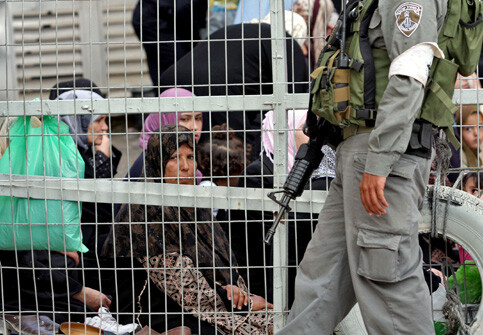Gaza Strip 29 September 2008

Palestinians wait at a checkpoint before they attend Friday prayers at the Ibrahimi mosque in the West Bank city of Hebron, 26 September 2008. (Mamoun Wazwaz/MaanImages)
Ramadan al-Hour’s four children have not seen their father for the past year. Ranging in age from five years to four months old, Amal, Aya, Sulaf and Walid live with their mother in the town of Kufr Qassem inside Israel. Israeli authorities have prevented al-Hour’s wife and children from entering Gaza. Ramadan, 35 years old, is from the Nuseirat refugee camp in the central Gaza Strip and used to work in Israel. A year ago he was arrested by Israeli security forces from his home in Kufr Qassem. Since then, he has been prevented access into Israel.
“What I can say, I am increasingly feeling depressed because I am unable to see them, to embrace my children or to pamper my four-month-old baby. My life has become miserable under this siege,” al-Hour said.
“Every time I speak to my daughter Amal over phone, she asks me the same questions: when does your work finish, dad? We want to see you badly. The work never finishes, she wonders every time. For how long I can lie to them that I am busy working?”
Al-Hour was married a few years ago, before the Israeli authorities banned family reunification of spouses from the Occupied Palestinian Territories and Israel. However, Ramadan could not obtain Israeli residency despite several application attempts.
“For the past two months, my wife has formally applied for entry into Gaza at the Erez checkpoint [in the northern Gaza Strip], yet she received no response from the concerned Israeli authorities,” he said.
“In spite of the fact that this procedure is totally consistent with Israeli law, every time my wife phones the authorities, she hears an answering machine saying ‘do not leave a message,’” al-Hour explained. He added, “Is that humane that we still can not see each other for more than a year? Is that humane that even in such an occasion of the Eid al-Fitr, we can not embrace each other? It’s really ruthless, so ruthless.”
Essam Hamdan, 40 years old, from the Khan Younis refugee camp in the southern Gaza Strip tells a similar story. He has lived alone for the past two months after his wife, who is originally from the West Bank city of Tulkarm, was forced by the Israeli authorities at the Erez checkpoint to sign a written pledge that she would not return to Gaza.
Hamadan’s wife was pregnant when she arrived at the checkpoint and needed urgent medical treatment in the West Bank. In spite of her condition and the fact that she had an Israeli permit to live in Gaza for one year, the Israeli authorities required her to sign the pledge or she would not be allowed to leave Gaza and she complied. Because of the severity of her condition, she was transferred to an Israeli hospital in Ashkelon, where she delivered four babies. Upon recovery, she and the children were transferred to the West Bank.
“Can you imagine, for 10 years I couldn’t have children, yet the moment God has met my wish, I can never see my dearest children,” Hamdan explained. “What a shortfall Israeli humanity is this, I really don’t know what to say. Shall I thank them for the treatment they provided to my wife or should I curse this occupation?”
Hamdan’s attempts to obtain a permit to visit his wife and children have been denied because he was previously arrested for working in Israel without a work permit. “I have already spent four months in prison, and now I am staying idle in Gaza for the past three years. I can hardly live because I haven’t worked,” he said.
Hamdan added that he would like to ask the Israelis “how can I pose a security threat to them while my life is now lost with no work and no job. All I want is to see my beloved children and enjoy some time with them. I have been looking forward to having children for ten years, since I divorced my first wife.”
Al-Hour and Hamdan are just a small sample of hundreds of similar cases in the Gaza Strip of Palestinians who are victims of Israel’s “security considerations.” As a result, these families will be unable to spend the Eid al-Fitr holiday, which begins at the end of the holy month of Ramadan, together.
Rami Almeghari is contributor to The Electronic Intifada, IMEMC.org and Free Speech Radio News. Rami is also a former senior English translator at and editor-in-chief of the international press center of the Gaza-based Palestinian Information Service. He can be contacted at rami_almeghari A T hotmail D O T com.





